studentthoughtsonsocial-blog
10 posts
This Tumblr blog contains work produced for MDA20009 Digital Communities.
Don't wanna be here? Send us removal request.
Text
Great firewall of China
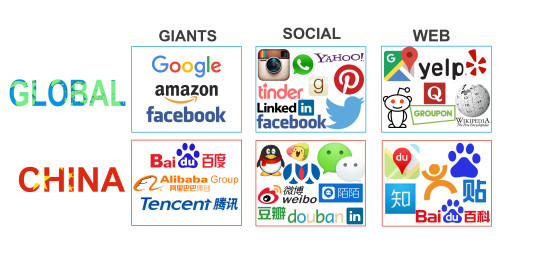
With approximately 500 million users of social media in China, 90% of them are going through a a youth identity period whereby social media is becoming greater than just a user experience for them, it is becoming a mechanism helping them explore the social identity they are constructing. Although the government has an aim to censor the internet for their citizens, it doesn’t seem to be causing too greater impact for them s their primary interest lays with connecting with other Chinese citizens. With Chinese based social media platforms being developed for their citizens, the growth and adoption of these sites expanding exponentially. It surprised me to learn that there are 532 million people using instant messaging and seemingly not missing out on what the web has to offer due with the country being the world’s most active social media population. When we compare with Facebook, the global reach of Facebook and the value of approximately $500 billion, WeChat which up until recently has been predominantly used only in China is becoming well known globally and is valued at approximately $60 billion.
With many aspects of social media creating a fulfilling user experience and connecting others when they traditionally would have been limited by distance, I believe that although there is a significant level of censorship in China, the locals are still receiving a fulfilling experience, are enabled the opportunity to connect and seek peer-to-peer recommendations. The progressive copycat nature of Chinese social media platforms is still allowing users to experience a slightly altered view of mainstream platforms, isn’t some connection better than none at all?
References
Chiu, C, Lin, D & Silverman, A 2012, China's social-media boom, McKinsey & Company, viewed 4 February 2018, <http://www.mckinsey.com/insights/marketing_sales/chinas_social-media_boom>.
Crampton, T 2011, 'Social media in China: The same, but differen't, China Business Review, Vol. 38, no. 1, pp. 28-31, viewed 4 February 2018 , <http://www.thomascrampton.com/china/social-media-china-business-review/>.
DLDconference 2013, DLD13 - How Social Media is changing China and Asia, 7 February, viewed 4 February 2018 , <https://www.youtube.com/watch?v=rG3z2ucaR6A>.
The Great Firewall of China 2013, Open Democracy viewed 4 February 2018 , <https://www.opendemocracy.net/china-correspondent/great-firewall-of-china>.
TED 2012, Behind the Great Firewall of China, June, <http://www.ted.com/talks/michael_anti_behind_the_great_firewall_of_china>.
1 note
·
View note
Text
Playing the crowd
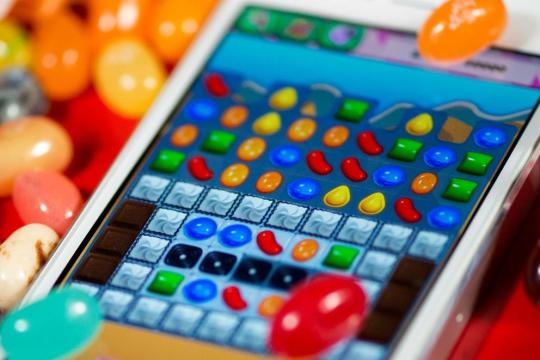
The concept of online gaming is not something I personally understand. Growing up in the 80 – early 90’s our time (my sister and I) was limited to appreciating family, friends and the outdoors. We came inside from playing in the street when it started to go dark and our time in front of the TV was limited. I remember going to a friend’s house who had a Nintendo Entertainment System, and wow was that a significant event as we would never be allowed to have something like that at home. As Dad would say, “that is an insult to your intelligence”.
We look forward to the late 90’ and into the naughties, and the rise of social gaming has become much more prevalent in modern society, afforded by the internet and social media platforms. Tim Le Tourneau highlights ‘social is the backbone of all of our games; the ability to play with all of your friends, that;s what makes these games stand apart. And it really is the thing we consider first and foremost whenever we are designing a game”. With socialisation promoted through gaming, the associated common goals and promoted game rules which are used to establish a field of interaction, are there implications for participants who willingly participate in essentially a contractual environment? This virtual environment which although seems like an opportunity to form online relationships, gain status and achieve things which may be out of reach, in ‘reality’ is actually limited by rules and socially acceptable behaviours. Zwart and Humphreys explore the concept of players and alluding to them fundamentally being actors who develop their own social norms and try to present different aspects of themselves while performing different roles. It is noted that it is expected social gaming members will uphold a set of behaviours and guide other gamers in the process however is it possible that social gaming can form an individual’s reality and take precedence over other life interests? I continue to refer back to the concept of digital citizenship and the responsibilities encompassed within citizenship, how do these associated responsibilities apply to social gaming?
I found it increasingly upsetting to read that a study undertaken found 57% of young people surveyed had experienced an element of bullying when playing games and the significant impact of this irresponsible digital behaviour is best described by a respondent as “If you’re going to school every day and you’re being bullied in school you want to go home to your computer to escape”.
The more I read and analysis situations contextually, I am increasingly convinced that we are all seeking a form of escapism through the affordances social platforms offer users, while allowing us the opportunity to project our ideal self to our peers (both on and offline / distant connections), and social gaming is no exception to this concept. Like everything, there are repercussions for our behaviours and once again social gaming is not exempt from that.
References
Anon, (2018). When Cyberbullying and Bullying Meet Gaming: A systemic Review of the Literature.
Arxiv.org. (2018). Available at: https://arxiv.org/pdf/1504.02305.pdf [Accessed 28 Jan. 2018].
BBC News. (2018). Gaming addiction classified as disorder. [online] Available at: http://www.bbc.com/news/technology-42541404 [Accessed 28 Jan. 2018].
BBC News. (2018). 'One in two' online gamers bullied. [online] Available at: http://www.bbc.com/news/technology-40092541 [Accessed 28 Jan. 2018].
de Zwart, M & Humphreys, S 2014,' The Lawless Frontier of Deep Space: Code as Law in EVE Online', Cultural Studies Review, vol. 20, no. 1, pp. 77-99.
Suzor, N & Woodford, D 2013, 'Evaluating consent and legitimacy amongst shifting community norms: An EVE Online case study', Journal of Virtual Worlds Research, vol. 6, no. 3, pp. 1-14.
0 notes
Text
Visual communities
“You are the sum of your published experience” – Evan Spiegal

When I was younger it was a significant event to have family/individual portraits taken and have them displayed proudly in the home. And at event capturing those cherished memories of the time had a real process behind it. A photo is taken, once the film was used it was taken for developing, then there was the waiting period to pick up the photos. And for the most part everyone who featured in the photo has given their consent to be in the photo (or at least a level of informed consent). How much that has changed, we as a society has become one that can be viewed as both manufactured and disposable. When we look back to our first few weeks of digital exploration and our ability to project our ideal self, what does it mean for others when someone else takes control of that and posts images / content which contradicts your ideal self?
There are many examples available for of what ‘you should not post on social media’ , articles on typical things we fake in our social media lives on social media (which take us back to the perception of our ideal self), and now more popularity the trend of visual communities and publics highlight the superficial side to social media . As we continue to delve deeper into digital approaches of visual communities it is becoming noticeable that processes are changing and both users and business are adapting process, building brand strategies and altering their method of engagement, all to remain at the forefront of consumers’ minds. In a digital culture where our communities have become so visual through disposable and sometimes thoughtless imagery, how do we uphold realistic values and perceptions of our ideal self when we are losing an element of control of what others post about us, in addition to being so heavily influenced by digital media advertising?
In my view we need to continue sharing the realistic side of social media and that it’s OK when we don’t conform to a particular stereotype. Remembering what we discussed in week 7, that one of the elements of bullying is an imbalance of power, therefore let’s embrace our differences.
As Barack Obama famously said One of the dangers of the internet is that people can have entirely different realities. With many things being shared on the internet, we need to keep in mind that there can sometimes be repercussions.
References
Bullas, J. (2018). 30 Things You Should Not Share On Social Media - Jeffbullas's Blog. [online] Jeffbullas's Blog. Available at: http://www.jeffbullas.com/30-things-you-should-not-share-on-social-media/ [Accessed 5 Jan. 2018].
HuffPost. (2018). 11 Things We Fake In Our Social Media Lives. [online] Available at: https://www.huffingtonpost.com/lexi-herrick/11-things-we-fake-in-our-social-media-lives_b_7693182.html [Accessed 5 Jan. 2018].
Mail Online. (2018). 75% of people say they fake how exciting their lives are on Facebook. [online] Available at: http://www.dailymail.co.uk/sciencetech/article-3274749/Welcome-Fakebook-75-people-admit-making-lives-exciting-social-media.html [Accessed 5 Jan. 2018].
PetaPixel. (2018). Instagram vs. Reality: How People Lie About Their Lives with Photos. [online] Available at: https://petapixel.com/2017/07/28/instagram-vs-reality-video-shows-people-lie-life-photos/ [Accessed 5 Jan. 2018].
society, B. (2018). Barack Obama tells Prince Harry 'irresponsible' social-media use risks fragmenting our society. [online] Business Insider. Available at: http://uk.businessinsider.com/obama-tells-prince-harry-social-media-corroding-civil-discourse-2017-12/?r=AU&IR=T [Accessed 4 Jan. 2018].
2 notes
·
View notes
Text
Crowdsourcing.. is the power of knowledge and a voice to be heard being handed out too easily
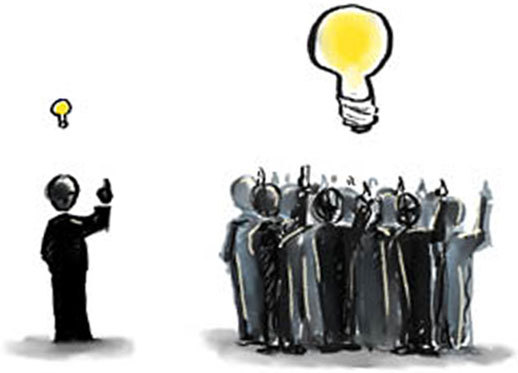
The power of the crowd
‘The practice of obtaining needed services, ideas, or content by soliciting contributions from a large group of people and especially from the online community rather than from traditional employees or suppliers'. (Merriam Webster Online 2014).
Online platforms have afforded the general public (and agencies) the ability to reach people at a large scale, whether this is to seek feedback or ideas the practice of crowdsourcing has become a frequent practice for many organisations. So for those organisations that actively practice crowdsourcing is this simply a beneficial practice or should crowdsourcing be met with an element of caution? Or should they just be thankful that the end result of the outsourcer achieving the end goal enough?
As an online platform, the internet has essentially removed the physical barriers that once existed before the age of the internet and has allowed for the connectivity of people from global locations. Creating a more fulfilling experience for most, if not all, anyone with internet access has the ability to have a voice and post something to share knowledge and content with people from far locations and different cultures. To extend this concept we explore Social Mapping and the affordances the associated technology offers. Matthew White outlines the attributes of social mapping and the common components of social, discovery, navigation and mapping elements.
Social media platforms have enabled user the ability to engage in content easier and allowed for a greater sense of belonging with meaningful connection. Whether this be in a time of need / when disaster hits or simply your ability to share new information (for example venues) with friends in real time.
From both a crowdsourcing, social mapping and the safe and accurate collection and distribution of data, what are the risks of allowing the general public to essentially become amateur journalists from a ‘subjective’ point of view?
In addition to the accurate reporting of events or even genuine contribution to ideas from a crowdsourcing perspective (explored below), who owns the data and are there the necessarily measures in places to protect what could be viewed as sensitive information. From the time of originally writing this post a news article has been released which I believe worthy of highlighting, and discloses. Strava, a social network and social mapping platform for athletes capable for tracking users performance, ranks you against others released data maps of users activities which inadvertently may have been sensitive information of military bases and conflict zones based on users activities. With commentary from the article discussing potential implications of the data publication citing “It also shows the turns patrols take when moving through towns in Syria: "You can see the main supply highway for US forces in Syria, and I just remember thinking 'f***, that's not good'," Mr Ruser said.
"Patrol routes, isolated patrol bases, lots of stuff that could be turned into actionable intelligence," tweeted ex-British Army officer Nick Waters.”
Moving past this article and once again considering the power of crowdsourcing for new ideas, and also the ramifications of empowering the general public to share an opinion (without them making a mockery of their opinion being heard), let’s take a look at some key examples of where crowdsourcing has taken a turn which was not what the original objective intended:
The 5 biggest crowdsourcing fails of all time
When we think about the progression of online platforms and their affordances, I believe we still have a long way to go with setting parameters before we entrust the general public and open platforms the ability to capture and distribute valuable information as this information may be to the detriment of others / organisations who stand for a valuable cause.

References
Inc.com. (2018). The 5 Worst Crowdsourced Ideas of All Time. [online] Available at: https://www.inc.com/minda-zetlin/the-5-biggest-crowdsourcing-fails-of-all-time-.html [Accessed 12 Jan. 2018].
Mwa2013.museumsandtheweb.com. (2018). Social Mapping: What Is It and Why Should We Care? | MWA2013: Museums and the Web ASIA 2013. [online] Available at: https://mwa2013.museumsandtheweb.com/paper/social-mapping-what-is-it-and-why-should-we-care/ [Accessed 11 Jan. 2018].
Strava.com. (2018). Strava | Run and Cycling Tracking on the Social Network for Athletes. [online] Available at: https://www.strava.com/features [Accessed 13 Jan. 2018].
Bruns, A, Burgess, J, Crawford, K & Shaw, F 2012, #qldfloods and @QPSMedia: Crisis Communication on Twitter in the 2011 South East Queensland Floods, Arc Centre of Excellence for Creative Industries and Innovation, pp. 7-10,, <http://www.cci.edu.au/floodsreport.pdf>.
Howard, J 2006, ‘The Rise of Crowdsourcing’, Wired, 14 June, viewed 13 January 2018, <http://archive.wired.com/wired/archive/14.06/crowds.html>.
0 notes
Text
Trolling and our responsibility as an online citizen

Continuing the discussion of digital citizenship we further explore the concept in the capacity of trolling and social media, and essentially the misuse and disregard of the responsibilities of being a ‘responsible’ citizen.
To define trolling, week 7 learning materials describe the characteristics of trolling as a ‘loose set of acts and activities, and as cultures of practice and modes of social media participation’.
Where does that leave bullying or cyber bullying... Danah Boyd highlights that although different aspects of youth-related meanness and cruelty has been examined, there is no universal definition of bullying. However as a means to differentiate bullying from other forms of youth aggression, in 1970 a Swedish psychologist narrowed the activities to three (3) components he saw as central to bullying, namely:
· Aggression
· Repetition
· An imbalance in power
When all three components were involved in a situation it was reasonable to call the act bullying.
Therefore in a digital age it is naive to assume that without social media we would see a lessened rate in bullying instances or trolling for that matter, social media has afforded these acts to be most visible on a public platform.
In 2016 The Guardian published an article highlighting that a survey of 13 to 18 year olds found 24% had been targeted via an online platform (cyber bullying), and one in 25 were singled out for abuse all or most of the time.
Although the word trolling is used in a context where there is humour involved there is a very fine line where is crosses a line and becomes a closer definition to that of bullying. If we are to search the definition of trolling on Urban Dictionary it highlights “trolling is convincing your victim that either:
a) truly believe in what you are saying, no matter how outrageous, or
b) give your victim malicious instructions, under the guise of help. Trolling requires deceiving; any trolling that doesn't involve deceiving someone isn't trolling at all; it's just stupid. As such, your victim must not know that you are trolling; if he does, you are an unsuccessful troll”.
In my view (simply put) they are a person who essentially hides behind their screens, for the most part acting anonymously, although let’s not disregard there are many protagonists on the internet, who actively go out of their way to seek and cause trouble on online platforms.
And with so many platforms available to users there are many avenues in which people can offend others, whether it be through comments on social media and online platforms (YouTube, blog posts, forums, email, any social networking site).
How do we deal with these individuals who either troll or bully others? It turns out that there are now legal ramifications for ‘trolls’ under Australia law. This may come as a relief for some to know that as we continue to progress into a digital age measure and mechanisms are being deigns to promote responsible digital behaviour.
With these mechanisms in place, how do we ensure as digital citizens that we all play our part in creating a safer online platform experience for all in order to allow for others to benefit from the opportunities technology and online platform provide?
I believe a significant opportunity exists for all users of online platforms to be educated around the affordances that online platforms offer. This starts with:
1. Let’s correctly define what certain acts are, for example: what are the points of different between trolling and cyber bullying? When does trolling become cyber bullying?
2. What is flaming and when does flaming become something else?
3. How do we determine when something is seen as ‘just causing drama’?
We can influence behaviours and make other digital citizens see that their online activity and actions can have grave impacts on others; we just need to determine the best way to do this.
No doubt is a question that has been asked by many.
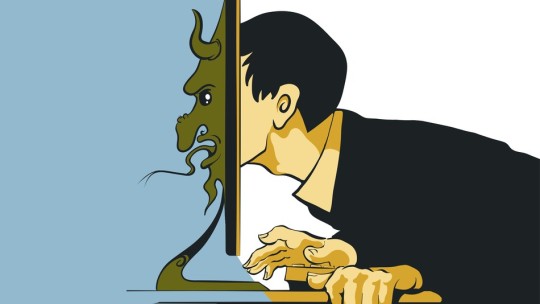
References
Boyd, D 2014, 'Bullying: Is the Media Amplifying Meanness and Cruelty?', in It’s Complicated: The Social Lives of Networked Teens, Yale University Press, New Haven, USA, pp. 128-52.
Donath JS 1999, ‘Identity and deception in the virtual community’, in MA, Smith & P, Kollock (eds), Communities in Cyberspace, Routledge, London, pp. 27-58.
En.wikipedia.org. (2018). Flaming (Internet). [online] Available at: https://en.wikipedia.org/wiki/Flaming_(Internet) [Accessed 11 Jan. 2018].
Findlaw.com.au. (2018). Internet Trolls can be Prosecuted Under Australian Law. [online] Available at: http://www.findlaw.com.au/articles/4259/internet-trolls-can-be-prosecuted-under-australian.aspx [Accessed 11 Jan. 2018].
Gani, A. (2018). Internet trolling: quarter of teenagers suffered online abuse last year. [online] the Guardian. Available at: https://www.theguardian.com/uk-news/2016/feb/09/internet-trolling-teenagers-online-abuse-hate-cyberbullying [Accessed 11 Jan. 2018].
Law Report 2014, Can A Cyber-Bullying Commissioner Protect Our Kids?, Radio National, 27 February, viewed 3 August 2016, <http://www.abc.net.au/radionational/programs/lawreport/5286036>.
Urban Dictionary. (2018). Urban Dictionary: Trolling. [online] Available at: https://www.urbandictionary.com/define.php?term=Trolling [Accessed 11 Jan. 2018].
Waynedenner.com. (2018). Online Trolling and the effects on Young People. [online] Available at: https://waynedenner.com/blog/online-trolling-and-the-effects-on-young-people [Accessed 11 Jan. 2018].
0 notes
Text
Activism and protest
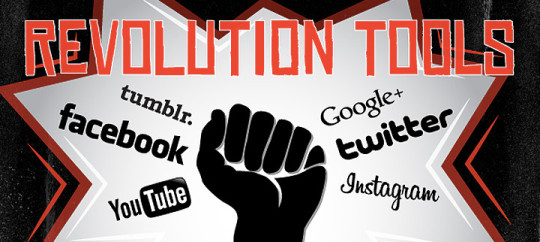
Social media platforms serve various functions to individuals, as we have seen with politicians use of social media to share campaigns and political change, we also find that social media affords the ability to create a collective call to action (Gerbaudo 2012) and opposition in the form of activism and protest behaviour. Those who employ the use of social media for activism practices need to ensure a level of responsibility is considered and upheld as digital citizens.
Although social media platforms enable users to ‘build links with with transnational networks of advocates who provide a counterbalance of state power (Youmans & York 2012), how are activists bringing attention to specific causes and are their campaigns effective?
Activism and collective action through the use of internet-based applications came into the spotlight in 2011, with Twitter, Facebook and YouTube being used to create external attention through different purposes. Gerbaudo highlights the various approaches taken to get people to the streets with Facebook being used to form groups, create common interest connections and set event dates, Twitter used to share event details and YouTube (in addition to other media sharing sites) to share visual details to the world.
In 2011 the Occupy Wall Street activism movement started initially through a blog post, and resulted in the hash tag ‘OccupyWallStreet’ and ‘OWS’ being born and a plethora of protests across the U.S. Protesters uses their mobile phones, Twitter, Facebook and YouTube to spread their message. It has been noted by experts that online tools alone are not enough to sustain causes, with ‘the ability to focus on a national agenda will depend on actual, on-the-ground, face-to-face actions, laying your body down for your principles - with the ability to capture the images and project them to the world’ (New York Times 2011).
So what happens when those who believe in a cause yet make minimal effort to support the cause? These actions are best described as a “slacktivism” effort (Youmans & York 2012).
Although social media contributes to collective action, it also enables activities of “liking” causes as a means of self-fulfillment, as opposed to actively making a social or political impact.
When we look at social media holistically, although it has created a mechanism for collective action sometimes the desired result is not guaranteed.
Is it not better to highlight and raise awareness on particular causes even when a lack of hierarchy, often found in social media, can prevent effective planning and be prohibitive to the long term activism effort?
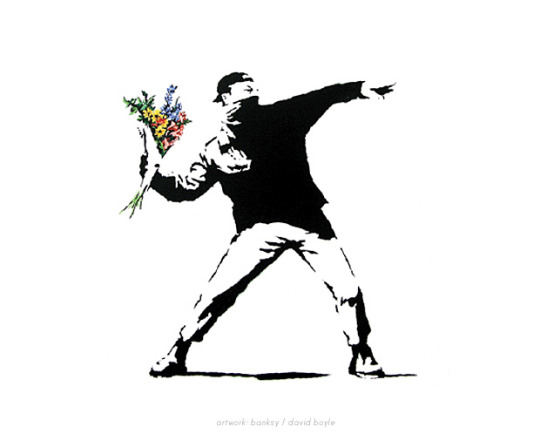
1 note
·
View note
Text
Politics and civic culture
youtube
In a digitally progressive age, social media has enabled the general public to become active participants in amateur journalism, critics (including through activism approaches) and supporters of political agendas in real time. Further, it has been highlighted that social media can be an effective tool for encouraging political change (Jericho, G 2012) while creating an open dialogue between politicians and the general public.
In global and local politics, politicians have embraced social media as another mean of engagement with the public, however the effectiveness and in some cases the objective of the use of this medium is still developing and finding the right balance provides a challenge. An effective political approach to social media has been discussed as one where each platform is used in conjunction with one another, as opposed to in isolation, to influence resources and increase engagement.
To compare the activity of two prominent world leaders and their approach to social media, namely Donald Trump and Malcolm Turnbull, I will explore their various approaches and relative criticisms.
The internet ha expanded the volume and sources of political communications (Young, 2010) and Malcolm Turnbull’s approach to social media is one that engages a combination of platforms to share political messages / communications, election campaigning and a balance of personal insights and activities. In my view this holistic approach has an underlying objective to reach a wide audience (through the various platforms) and the sometimes personal touch to posts makes him more relatable. Ultimately lessening a perceived divide between Malcolm Turnbull and his voters. However with most public approaches there will be strong opposing views of critics. In September of 2017 Malcolm Turnbull posted an image of himself holding his grandchild in one arm while holding a beer in the other at the footy, captioned ‘multitasking at the footy’(TheWest, 2017). Although his intent may had been innocent and an attempt at being relatable, or potentially a deflection to others while there was a controversial topic on the Australian political stage, there was a mixed response received to the post. This included support for Malcolm Turnbull as being seen as a ‘genuine Aussie guy’ in addition to a significant amount of backlash to his ‘parenting’ approach, while others used the opportunity to criticize him over a current political topic. Now while this seemed like it was a pressing topic in Australia, if this post made it to a global stage would the reaction from other be the same?
Throughout the course of Donald Trumps 2016 presidential election campaign an article written by Matthew Ingram cites social media as playing an important role in his campaign and a significant reason behind his ultimate election. Looking forward since Donald Trump’s January 20 2017 inauguration, Donald Trump has significantly engaged social media (predominantly Twitter) (Wikipedia, 2018) to ensure his opinions are heard on the world stage.There has been much discussion and a recent Fox News poll highlight that the general public believe his tweets are hurting his agenda. Further reviews have been conducted on the tweet he posts, with one 2016 review citing one in every eight Twitter posts were a personal insult of some kind and as of November 2017 he ‘had insulted 394 people, places, and things on Twitter, ranging from politicians to journalists and news outlets to entire countries’ (Wikipedia 2018). Various opinion pieces have been written regarding Donald Trump’s conduct, both on and offline, with The Atlantic openly writing a damning article which open with the statement ‘we have never has a president so ill-informed about the nature of his office, so openly mendacious, so self-destructive, or so brazen in his abusive attacks on the courts, the press, Congress, and even senior officials within his own administration. Trump is a Frankenstein's monster of past president’s’.
When we compare the activity of both leaders what kind of impression of the individual are you left with? Do they seem somewhat professional and measured in their approach to public engagement, or are they opening themselves up to be made a mockery of by others which further destroys their credibility in the public arena?
https://www.theguardian.com/us-news/video/2017/jun/15/were-winning-so-much-malcolm-turnbull-mocks-trump-at-canberra-ball-video
youtube
https://www.viralviralvideos.com/tag/donald-trump/
1 note
·
View note
Text
BP 2: reposted

Social media and the credibility of bloggers…
According to (Cross 2011) the ‘blogosphere has a wider reach and larger audience than any media has ever had, and as of October 2017 there are 373 million Tumblr blogs. 94% of people share blog content as they think it could be useful to others, therefore if the content is useful to others this may assist with the possibility of it being shared. So what can one do to stand out in a competitive blogosphere? The answer is simple, become an influencer! Contradictory to the initial reasons behind starting a blog, in order to keep it interesting and relevant the blog needs to be updated frequently, which often translate to the quantity of posts over the quality of posts which in turn can impact the blogs Google status. However if this is done correctly (a combination of quantity and quality posts) bloggers have the ability to start trends and affect culture, think of the use of ‘bae’, ‘fleek’, ‘twerking’ being incorporated in everyday conversation (yes I did have to Google some of those words myself) (Cross 2011).
The role of blogs have been seen as a tool for information sharing and emotion management (McCosker 2013), in addition to being seen as trusted sources of advice and information for those seeking information online in order to make a decision (McCoy, 2017). So what happens when you notice a change in the style of writing of a blogger who you have invested in, in an affective sense, to include sponsored / paid content. Sponsored posts are described as advertorials or a company has paid a blogger or website writer to write an endorsement. Does this mean that the ultimate motivation behind starting the blog has shifted and in your mind as a reader, has the credibility of the blogger changed? Dianne Jacob wrote an article in 2014 which highlights readers’ dislike of sponsored posts and most can feel both confused and deceived by the sponsored content. “The knowledge that someone is paying to have that person write about a place or product makes me feel like the blogger is, for lack of a better term, ‘selling out.’” However others feel that if there was disclosure and greater transparency from the blogger that they were receiving some form of payment for the post then there wasn’t too much of an issue for the reader (Dianne Jacob, Will Write For Food, 2017). Either way, regardless of how we view the credibility of a blogger who writes sponsored content, if you are seeking information in order to make informed decisions from a blog this highlights the importance of doing your own research.
References
azcentral. (2017). 7 pop culture trends for 2017 that you need to know. [online] Available at: https://www.azcentral.com/story/news/local/arizona-contributor/2017/01/11/7-pop-culture-trends-2017-you-need-know/96453708/.
Cross, M 2011, Got Blog, in Bloggerati, Twitterati: How blogs and Twitter are transforming popular culture, Praeger, Santa Barbara.
Dean, M. (2017). 'I cannot be that person': why the 'Queen of the Mommy Bloggers' had to quit. [online] the Guardian. Available at: https://www.theguardian.com/media/2015/sep/23/heather-armstrong-leaving-dooce-mommy-blog-advertisers.
Dianne Jacob, Will Write For Food. (2017). It's Official: Readers Don't Like Sponsored Posts - Dianne Jacob, Will Write For Food. [online] Available at: https://diannej.com/2014/its-official-readers-dont-like-sponsored-posts/ .
McCosker, A 2008, 'Blogging Illness: Recovering in Public', M/C Journal, vol. 11, no. 6, pp. 1-8.
McCosker, A & Darcy, R 2013, 'Living with Cancer: Affective Labour, Self-Expression and the Utility of Blogs', in Information, Communication and Society, vol. 16, no. 8, pp. 1-20.
McCoy, J. (2017). Why Blog? 52 Incredible Blogging Statistics to Inspire You. [online] Express Writers. Available at: https://expresswriters.com/blogging-statistics/.
millions), C. (2017). Tumblr: total number of blogs 2017 | Statistic. [online] Statista. Available at: https://www.statista.com/statistics/256235/total-cumulative-number-of-tumblr-blogs/.
The Odyssey Online. (2017). Where Did 'Fleek' Come From?. [online] Available at: https://www.theodysseyonline.com/where-did-fleek-come-from?utm_expid=.cZCE7oX8QCubI-ziFLsOXg.0&utm_referrer=https%3A%2F%2Fwww.google.com.au%2F.
1 note
·
View note
Photo

BP 2
Social media and the credibility of bloggers…
According to (Cross 2011) the ‘blogosphere has a wider reach and larger audience than any media has ever had, and as of October 2017 there are 373 million Tumblr blogs. 94% of people share blog content as they think it could be useful to others, therefore if the content is useful to others this may assist with the possibility of it being shared. So what can one do to stand out in a competitive blogosphere? The answer is simple, become an influencer! Contradictory to the initial reasons behind starting a blog, in order to keep it interesting and relevant the blog needs to be updated frequently, which often translate to the quantity of posts over the quality of posts which in turn can impact the blogs Google status. However if this is done correctly (a combination of quantity and quality posts) bloggers have the ability to start trends and affect culture, think of the use of ‘bae’, ‘fleek’, ‘twerking’ being incorporated in everyday conversation (yes I did have to Google some of those words myself) (Cross 2011).
The role of blogs have been seen as a tool for information sharing and emotion management (McCosker 2013), in addition to being seen as trusted sources of advice and information for those seeking information online in order to make a decision (McCoy, 2017). So what happens when you notice a change in the style of writing of a blogger who you have invested in, in an affective sense, to include sponsored / paid content. Sponsored posts are described as advertorials or a company has paid a blogger or website writer to write an endorsement. Does this mean that the ultimate motivation behind starting the blog has shifted and in your mind as a reader, has the credibility of the blogger changed? Dianne Jacob wrote an article in 2014 which highlights readers’ dislike of sponsored posts and most can feel both confused and deceived by the sponsored content. “The knowledge that someone is paying to have that person write about a place or product makes me feel like the blogger is, for lack of a better term, ‘selling out.’” However others feel that if there was disclosure and greater transparency from the blogger that they were receiving some form of payment for the post then there wasn’t too much of an issue for the reader (Dianne Jacob, Will Write For Food, 2017). Either way, regardless of how we view the credibility of a blogger who writes sponsored content, if you are seeking information in order to make informed decisions from a blog this highlights the importance of doing your own research.
References
azcentral. (2017). 7 pop culture trends for 2017 that you need to know. [online] Available at: https://www.azcentral.com/story/news/local/arizona-contributor/2017/01/11/7-pop-culture-trends-2017-you-need-know/96453708/.
Cross, M 2011, Got Blog, in Bloggerati, Twitterati: How blogs and Twitter are transforming popular culture, Praeger, Santa Barbara.
Dean, M. (2017). 'I cannot be that person': why the 'Queen of the Mommy Bloggers' had to quit. [online] the Guardian. Available at: https://www.theguardian.com/media/2015/sep/23/heather-armstrong-leaving-dooce-mommy-blog-advertisers.
Dianne Jacob, Will Write For Food. (2017). It's Official: Readers Don't Like Sponsored Posts - Dianne Jacob, Will Write For Food. [online] Available at: https://diannej.com/2014/its-official-readers-dont-like-sponsored-posts/ .
McCosker, A 2008, 'Blogging Illness: Recovering in Public', M/C Journal, vol. 11, no. 6, pp. 1-8.
McCosker, A & Darcy, R 2013, 'Living with Cancer: Affective Labour, Self-Expression and the Utility of Blogs', in Information, Communication and Society, vol. 16, no. 8, pp. 1-20.
McCoy, J. (2017). Why Blog? 52 Incredible Blogging Statistics to Inspire You. [online] Express Writers. Available at: https://expresswriters.com/blogging-statistics/.
millions), C. (2017). Tumblr: total number of blogs 2017 | Statistic. [online] Statista. Available at: https://www.statista.com/statistics/256235/total-cumulative-number-of-tumblr-blogs/.
The Odyssey Online. (2017). Where Did 'Fleek' Come From?. [online] Available at: https://www.theodysseyonline.com/where-did-fleek-come-from?utm_expid=.cZCE7oX8QCubI-ziFLsOXg.0&utm_referrer=https%3A%2F%2Fwww.google.com.au%2F.
2 notes
·
View notes
Link
BP 1 The social media revolution…. Is it a fad, or is it the biggest shift since the Industrial Revolution?
An introduction to Digital Communities and the progression of social media platforms*, the social media revolution YouTube video highlights significant and progressive shifts in society and community. To put this revolution into perspective, it took 13 years for TV to reach 50 million users, 4 years for the internet to reach 50 million users and less than 9 months for Facebook to add 100 million users. And further to that statistic, if Facebook were a county it would be the 4th largest in the world behind China, India and United States. So where does these leave us, the consumers of social media creating social networks in a digital age? And is technology redefining human connection?
It has been noted that as individual we are using social media and communication devices to choose, construct negotiate, interpret and display who we are to be perceived. Does this enable us as users to project our ‘ideal self’ to others?
youtube
Sherry Turkle both highlights her excitement of technology however believes that it is letting us as consumers to be taken to places we don’t want to go. Believing our devices are so psychologically powerful they both change what we do and also who we are, undertaking quirks we may have considered in the past abnormal are now becoming familiar and normalised. A prime example of this concept is to consider the amount of time we spend ‘online’ or available/connected to a network. Those who are of the pre-internet and mobile phone generation would remember a time where we would make plans with someone, arrive at the predetermined time, and while spending time with that person would be completely invested in their company.. And, if it were perhaps a special occasion we may use a film based or early edition digital camera to capture precious memories for ourselves. Whereas now the most of us are, for the most part, always connected to the network peripherally connected to others, which has been enable by technology and other various platforms.
Therefore with an increase in virtual communities coupled with changes in society from more traditional face-to-face based relationships to communities and networks that are based on shared social practices and interests, as we engage with one another in digital communities it is certain that our behaviours are influenced. For those of us who have weak social network connections, we are essentially strangers to one another who have an ability to create a perception of our ideal self and seek affirmation from others through that created perception. Or on the other hand those who chose to remain anonymous have the ability to behave in a manner and experiment with their online behaviour(s) while keeping their identity private. Behaving anonymously does raise concerns about the perceived trust of those you may be engaging with or, other anonymous persons potentially causing harm through unsocial behaviours and their lack of integrity through not being identifiable. Unlike other media platforms, social media is not yet regulated however I believe this is an evolving area that needs further exploration. As users have the ability to publish their own content and content on others, where and how do we create boundaries that protect each other from either potential defamatory situations or matters of privacy exposure? While some may be comfortable with sharing every detail of their life, exaggerated or not or pure honesty as a therapeutic practice, there are other who don’t share the same preferences.
This is still a developing and unfamiliar area which will need further exploration as media platforms and technology capabilities continue to progress. I will leave you with a few articles below which I found thought-provoking regarding the moral compass of technology and associated platforms, addictive behaviours caused by social media and the regulation of social media. I look forward to you sharing your views:
*The term platforms defined in an online context as an ‘online services of content intermediaries’.
https://medium.com/doteveryone/the-tech-industry-needs-a-moral-compass-3ce1665a287f
https://www.theguardian.com/commentisfree/2017/nov/11/facebook-google-public-health-democracy
https://theconversation.com/regulate-social-media-platforms-before-its-too-late-86984
References
Buzzz Social Media 2011, The Social Media Revolution 2014, 23 October, viewed 3 August 2016, <https://www.youtube.com/watch?v=0eUeL3n7fDs>.
TED-Ed 2013, Connected, but alone?- Sherry Turkle, 19 April, viewed 3 August 2016, <https://www.youtube.com/watch?v=rv0g8TsnA6c>.
Wilken, R & McCosker, A 2014, 'Social Selves', in Cunningham & Turnbull (eds), The Media & Communications in Australia, Allen and Unwin pp. 291-295.
Center for Advanced Study, University of Illinois at Urbana-Champaign 2014, The Politics of Platforms, 21 January, viewed 3 August 2016, <https://www.youtube.com/watch?v=6hxcofU_o7Y>.
University of Arkansas 2009, Connected Lives: The New Social Network Operating System, 13 April, viewed 3 August 2016, <http://clintonschoolspeakers.com/lecture/view/connected-lives-new-social-network-operating-syste/>.
van der Negal 2013, 'Faceless Bodies: Negotiating Technological and Cultural Codes on reddit gonewild', Scan Journal of Media Arts Culture, vol. 10, no. 2, Macquarie University.
Boyd, d 2010, ‘Social Network Sites as Networked Publics’, in Papacharissi, Z, A Networked Self: Identity, Community, and Culture on Social Network Sites, Routledge, Hoboken, pp. 39-58.
Mizuko, I 2008 ‘Introduction’ in Vamelis, K (ed), Networked Publics, MIT Press, Cambridge, pp. 1-14.
2 notes
·
View notes